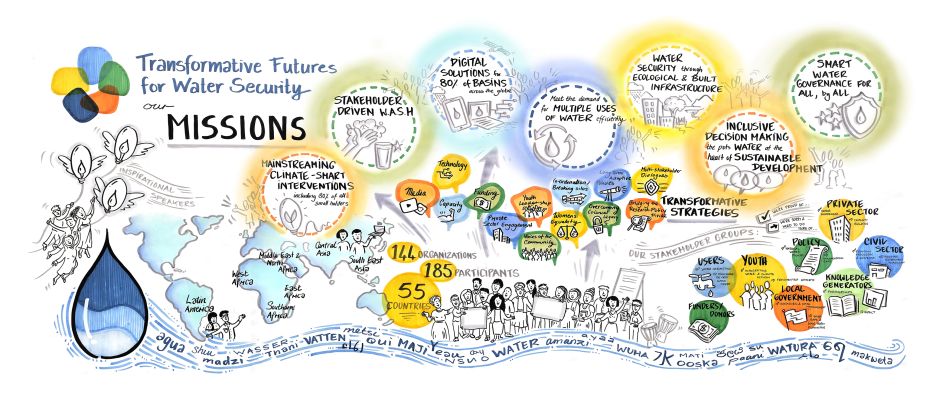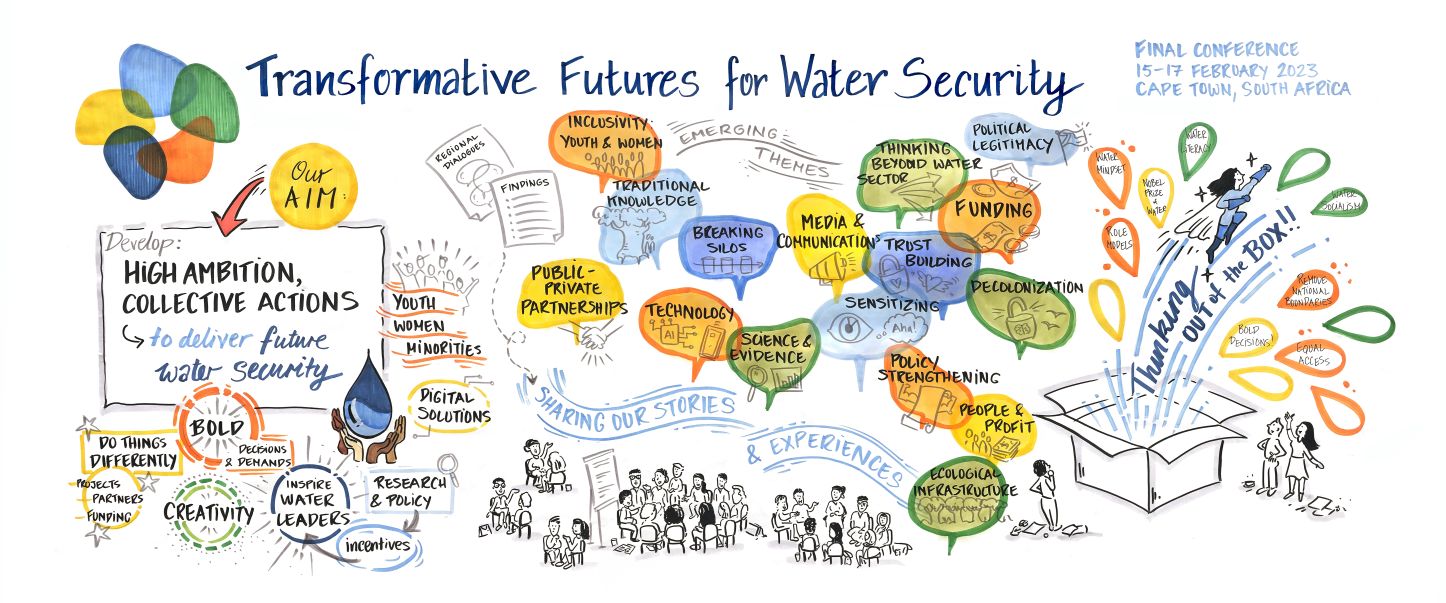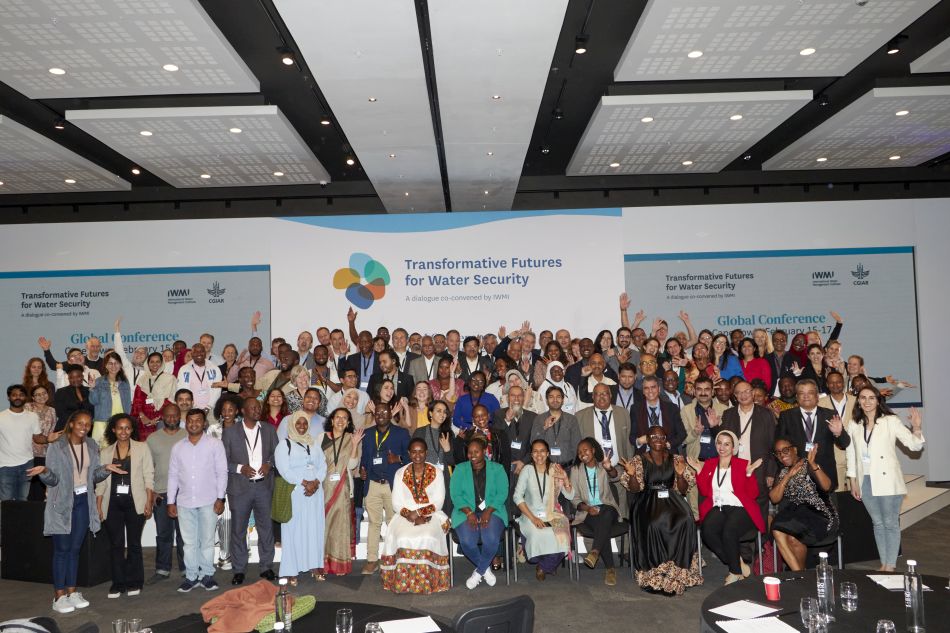
Currently, 1.42 billion people live in high or extremely high water-vulnerable areas. Water security is deeply intertwined with climate change, and without immediate and bold action, water availability will worsen. With a growing population, global water demand is projected to increase by 20–30% per year by 2050, which could leave even more people water insecure.
Populations at the highest risk of future water insecurity are in the Global South. This is due to complex hydrology, increased water-related risks, and poor advances in infrastructure, governance and water management.
This year marks the first United Nations (UN) Water Conference since 1977. It offers a critical opportunity to catalyze actions and innovations that bring increased water security to vulnerable communities across the globe. However, to make this possible, policies and action plans must be informed by the priorities and needs of the Global South.
The Transformative Futures for Water Security (TFWS) initiative is a unique process led by the Global South, raising the ambition for water management and bridging the gaps between science, policy and action. It ensures water research and innovation better serve the acceleration of Sustainable Development Goal 6 and progress toward water security for all. And it prepares the robust response required to tackle water risks that will only deepen.
A transformative and ambitious global conference
A key part of the TFWS process has been eight regional dialogues held across the Global South. These dialogues culminated in a TFWS conference held in Cape Town from February 15 to 17, 2023. Over 175 delegates from 55 countries, representing the regional dialogues and each stakeholder group, came together in this ground-breaking three-day event. Here, the outputs from the eight dialogues were assimilated in the final design of seven high-ambition missions for water research and innovation for development aligned with the objectives and outputs of the UN 2023 Water Conference.

Director General of the International Water Management Institute (IWMI), Dr Mark Smith, said: “Our goal with the Transformative Futures for Water Security initiative is to bring diverse voices together to press for urgent action on water security, and agree on collective priorities to drive the changes needed for a water-secure future. The messages from the regional dialogues have been clear – that youth, policy innovators, the scientific community, businesses and marginal and vulnerable voices from the Global South should be shaping the global agenda for water in the years to come”.
Recognizing the need for youth to be included in this conversation, young people have been made co-guardians of the TFWS process and co-hosts at the dialogues and conference. Fazrul Khairy, Youth co-guardian and Southeast Asia representative, said: “Young people will inherit the consequences of decisions made today. I have confidence that our voices will be heard at the highest level and help implement innovative solutions to influence change”. Youth have the greatest stake in future water security – identifying their key concerns and having their support is vital for the future of water security.
Missions for science-based action on water security

The conference identified missions that capture stakeholders’ water knowledge, research and innovation priorities. The missions are the result of the ground-breaking TFWS multi-stakeholder process which has included over 1,000 people from 400 organizations within and beyond the water sector in the Global South. Stakeholders emphasized the need to move away from projects and toward long-term missions, around which coalitions of researchers, funders, policy makers, civil society groups, businesses and others can align. Each mission will set an ambition for the transformation of water systems to catalyze future ready innovation and inclusive, science-based actions. These should include policy change, investment, and private sector and community-based action, for key challenge areas. Stakeholders called for missions to:
- Build farmers’ resilience to climate change and water risks – by using climate-smart interventions to raise water productivity and transform agriculture
- Deliver sustainable, stakeholder-driven WaSH services– with accountable institutions, adequate information and policies to achieve universal access
- Increase freshwater availability– through circular management of wastewater everywhere, new technologies for non-conventional water, and cutting non-revenue losses
- Make water infrastructure future ready– using ecological and built infrastructure that is complementary, equitable and resilient
- Overcome data and information barriers– by developing and operationalizing digital solutions for basins and aquifers worldwide
- Make water decisions fit for the future– by integrating the full range of values of water and the objectives of multiple sectors and stakeholders and their tradeoffs
- Deliver good water governance and transboundary cooperation– that is inclusive, participatory, equitable, accountable, responsive and smart
- Adapt to future water regimes and risks– with enhanced climate information, preparedness, management innovation and capacity development
Looking ahead to the UN 2023 Water Conference
IWMI will lead and speak at several key side events during the UN 2023 Water Conference, to amplify the diverse voices of water users and ensure that the seven key transformative missions prioritized by the Global South feed into the UN Water Action Agenda. IWMI will highlight that TFWS is an ongoing process, ensuring urgent and coherent policies and action on water security that is better supported by scientific progress. This will take scientific progress for a water-secure world beyond “business as usual”, accelerating action to achieve Sustainable Development Goal 6 and water security for all.
To learn more about the TFWS initiative, please visit the landing page.

